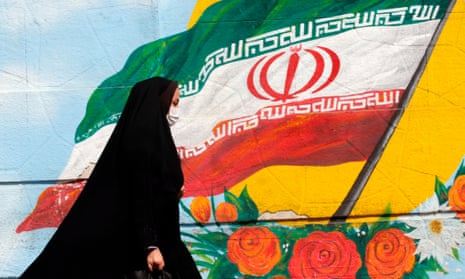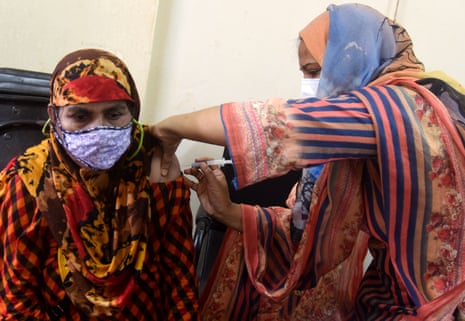This blog is closing now but thanks very much for reading. We’ll be back in a few hours with more rolling coverage of the pandemic from all around the world.
In the meantime you can catch up with all our coverage of the pandemic here.
This blog is now closed. You can the latest coverage of the pandemic here.

This blog is closing now but thanks very much for reading. We’ll be back in a few hours with more rolling coverage of the pandemic from all around the world.
In the meantime you can catch up with all our coverage of the pandemic here.
Canada will extend its ban on arriving passenger flights from India to 21 September because of the risks posed by Covid, the federal transport ministry said in a statement on Monday.
The ban was first imposed on 22 April and has already been rolled over several times. The measure does not apply to cargo flights or medical transfers.

The UK health department has refused to reveal how many people have turned off contact tracing on the NHS Covid-19 app.
The government admitted it knew the number, but refused to publish it – prompting speculation ministers were embarrassed their test-and-trace system was not as “world-beating” as promised.
Some people – including Tory MPs – have reported either deleting the app or permanently turning off contact tracing, amid fears a “pingdemic” is forcing people into isolation unnecessarily.
More than 2.1m alerts telling people to self-isolate were sent during July in England alone, leading to disruption of services including public transport, bin collections and food supplies.
After initially resisting calls to change the app to decrease its sensitivity, the health secretary, Sajid Javid, said the technology would be tweaked so that only people who came into contact with a positive Covid case two days before would be pinged, instead of five.
But confidence in the app already appeared to have faltered, with the number of new downloads in a week falling. According to a Savanta ComRes poll from mid-July, 19% of UK adults said they had already deleted the app and 20% that they planned to delete it.
People can also keep the app but turn off contact tracing, rendering useless the Bluetooth technology that scans nearby devices to alert users if someone they came into close contact with later tests positive.
When asked in a freedom of information request by the Guardian how many people had permanently turned off contact tracing, the Department of Health and Social Care (DHSC) admitted it did hold the relevant data.
But it said the information was being “withheld” under an exemption, known as “section 22”, allowing it to publish the figure at an unspecified date.
Here is the full story:

Germany wants to end free coronavirus tests in October, the RND group of newspapers reported on Monday, citing a draft proposal to be discussed by the chancellor Angela Merkel and leaders of the country’s 16 states.
The government made the tests free for all in March to make a gradual return to normal life possible after a lockdown to break a third wave.
But with 55% of the population fully vaccinated there have been calls to stop spending taxpayers’ money on a subsidised scheme that now mainly benefits those who are not yet vaccinated even though vaccines are available for all.
“Given that all vaccination is immediately available to all citizens, it is no longer justifiable that the federal government and therefore taxpayers cover the cost of all tests,” RND cited from a draft proposal.
Less than seven weeks before a federal election, Merkel and state leaders will discuss measures to keep rising new infections spurred by the Delta variant in check without instituting lockdowns.
The draft stipulates that people who cannot be vaccinated for health reasons like pregnant women and children under 18 will continue to be entitled to subsidised tests.
An exact date in October for curtailing the programme has not yet been made, RND added.
Germany has recorded more than 3,000 cases on each of the past five days, but with almost 63% of the population having received at least one shot the government is hoping lockdowns could be avoided.
The US Centers for Disease Control and Prevention (CDC) warned on Monday against travel to Israel, France, Thailand, Iceland and several other countries because of a rising number of Covid cases in those nations.
The CDC has been adding to its highest “Level 4: Very High” Covid level as cases spread around the globe. The US added Israel, the West Bank and Gaza, along with other places, including Aruba and French Polynesia.
The US State Department also issued its parallel “Level 4: Do Not Travel” advisories for Iceland and France on Monday.
In July, the CDC had raised concerns about Israel, the West Bank and Gaza, lifting its travel health notice by two levels to “Level 3: High.”
The CDC also hiked alert levels to Level 3 for Austria, Croatia, El Salvador, Azerbaijan, Guam, Kenya and Jamaica. The CDC says unvaccinated travellers should avoid nonessential travel to those countries.

Whitehall officials have held high-level talks about taking away a salary boost awarded to London-based civil servants amid efforts to encourage workers back to the office.
The Guardian understands that several UK government departments have considered stripping some officials of topped-up wages – known as London weighting and worth about £4,000 to offset higher living costs in the capital – if they resist at least a partial return to Whitehall.
Downing Street stressed on Monday that flexible working is here to stay and said there were no plans to dock civil servants’ pay. But the decision ultimately rests with each department, and some Tory MPs have piled pressure on them to take a tougher approach to end the move to working remotely during the pandemic.
The full story is here:
The European Union will not change its safe travel list this week, an EU official told Reuters on Monday, allowing non-essential travel from the United States to continue for the time being despite a surge in Covid cases there.
The list currently comprises two dozen countries, including the United States, Japan and Australia, which are considered safe from a health perspective under the ongoing pandemic.
Last week, an EU official said the inclusion of the US in the list might be reconsidered.
The list will be reviewed again in two weeks or even earlier if the Covid situation changes, according to EU officials.
The 27-nation bloc has repeatedly asked Washington to let in EU citizens after the US was added in June to the so-called white list.
The list is non-binding, although EU governments tend to apply it. They can however ignore it.
The EU is divided among states that are pushing for reciprocity from the US, and others that are more reliant on tourism and reluctant to remove the US from the list, officials have said.

The UK government is planning to relax key Covid-19 restrictions for delegates to the UN Cop26 climate conference to be held in Glasgow for two weeks this November.
Delegates from 196 countries are expected to attend the talks, viewed as one of the last chances for the world to agree limits on greenhouse gas emissions that would avoid the worst ravages of climate breakdown.
The government has offered vaccines to countries coming to the talks, to enable all delegates to be fully vaccinated before the event. However, officials were unable to say how many had taken up the offer.
Those who are fully vaccinated and from red list countries will have to self-isolate for five days in hotels on arrival, and for 10 days if they are unvaccinated. Most attendees are expected to arrive through London.
All vaccines – most of which require two doses to give full protection – will be recognised by the government for the purposes of the event. Attendees will also be tested frequently throughout the event, but additional booster vaccines will not be required.
There will be no requirement for Cop26 attendees coming from amber or green list countries to self-isolate on arrival in the UK whether vaccinated or not, officials said.
Around 20,000 are expected at the talks in what will be the biggest diplomatic meeting on UK soil since the second world war, and the biggest UK-hosted public event since the 2012 Olympics.
Scientists warned on Monday, in a landmark report, that extreme weather caused by human actions was now widespread across the world and would get much worse unless countries take drastic action to cut emissions now.
At Cop26, regarded as the most important climate talks since the Paris agreement was signed in 2015, countries will be asked to come forward with new commitments to reduce their carbon output in line with scientific advice.
The government has been determined to hold the event in person rather than virtually, a stance praised by veterans of the UN talks, who said forging an international deal would be impossible without face-to-face negotiations.
The full story is here:

Australia risks “eroding” its reputation as a welcoming place for international students if it does not offer them hope about when they can return to the country to study, a senior diplomat has said.
India’s high commissioner to Australia, Manpreet Vohra, said extended travel restrictions could cause frustration, uncertainty and anxiety among thousands of students who have been unable to travel to Australia to undertake their courses, adding that online education was “not what they signed up for”.
In an interview with Guardian Australia, Vohra said he was urging the Australian government to spell out a timeframe for a staged, Covid-safe return to on-campus studies so students had something “to look forward to”. It would be a pity if students ended up turning to other countries to continue their studies, he said.
Good evening from London. I’m Lucy Campbell, I’ll be bringing you all the latest global developments on the coronavirus pandemic for the next few hours. Please feel free to get in touch with me as I work if you have a story or tips to share! Your thoughts are always welcome.
Email: lucy.campbell@theguardian.com
Twitter: @lucy_campbell_

Sky News Australia has quietly deleted at least 31 videos that question the public health response to Covid-19 or promote unproven treatments as the broadcaster prepares for its chief executive, Paul Whittaker, to appear at a Senate inquiry on Friday, Guardian Australia can reveal.
Sky News will face the media diversity inquiry after the broadcaster was suspended from YouYube for seven days for posting 21 videos that violated the platform’s Covid medical misinformation policies.
Whittaker, presenter Sharri Markson and the Sky News digital editor, Jack Houghton, have all criticised YouTube for deleting the videos but Sky has given no explanation for scrubbing its own skynews.com.au website of what could be perceived as contentious content.
There is anger over overflowing Covid PCR test drop boxes, with the requirement for all UK international arrivals to provide at least one test within two days of landing branded “pointless” and “a rip off”.
One of the biggest providers, Randox, told the BBC it was increasing the number of drop boxes and the frequency of box collections after people posted pictures of returned test kits piled high in Sutton and Hampstead.
The size of the piles suggests the tests may not be being processed quickly enough for it to represent an effective strategy to contain Covid.
Labour MP Ben Bradshaw tweeted in reaction to the photos: “These pointless rip-off day two PCR tests for people returning from amber and green list countries, most of which have a fraction of our Covid-19 rates, are becoming a bad joke.”
Rory Boland, travel editor at Which?, told the BBC it has observed an increase in complaints over tests not arriving on time, inability to book and misleading prices.
“The system isn’t set up for large numbers of people travelling and now many people are travelling the system is not working properly,” he said. “The government might now say it is looking into the prices of tests, but it’s very late in the day and these problems were foreseeable.”
Gavin Marshall had dropped off a test kit on behalf of his daughter two days after her return from Portugal. “I had no choice but to leave the sample at that site, because there wasn’t enough time to get to another drop box before collection deadline,” he told the BBC, adding it represented a “Covid travel rip-off”.
A spokesperson for Randox told the BBC: “Randox is providing premium testing services in dynamic and rapidly changing circumstances and is committed to continuously improving its logistics network, to ensure that international travellers receive their results in time. All of the sample kits pictured will be processed.”
You think that one’s bad? pic.twitter.com/1TDX9Or5PK
— Tilly Slight (@Slightly) August 8, 2021
Tory peer Dido Harding will step down from her role as chair of NHS Improvement in October, after also overseeing the test-and-trace programme.
Harding was executive chair of NHS test and trace until April this year. The scheme has come in for criticism over the course of the pandemic, with a report from the Commons public accounts committee in March saying there was “no clear evidence” the £22bn venture contributed to a reduction in coronavirus infection levels.
Critics of England’s system have argued that test-and-trace systems in other places have worked much more effectively. Harding defended her record in June, saying the main issue with the service was that “expectations were set too high”.
Among her previous jobs, Harding was chief executive of TalkTalk for seven years until 2017, and before that worked in senior roles for both Sainsbury’s and Tesco.
Every time Dido Harding's name is mentioned I think back to this awkward photoshoot of her inexplicably agreeing to hold the Daily Mail's Wooden Spoon award for worst customer service in the UK when CEO at TalkTalk. https://t.co/2ASEqscXV3 via @MailOnline
— Rob Davies (@ByRobDavies) August 17, 2020
Nepal has today begun a rollout of second jabs for nearly 1.4m elderly people, following a months-long delay after neighbouring India halted exports over a surge in infections.
People aged over 65 became eligible from March to receive their first AstraZeneca-Oxford shots from India, but were unable to get their second dose after the stock ran out, AFP reports.
The vaccination drive was later opened in stages to everyone above 18 using 1.6m shots donated by China and 1.5m single-shot Johnson & Johnson vaccines sent by the US via the international Covax programme. The government has not allowed vaccine shots to be mixed.
After an international appeal by the government for vaccines, Japan donated 1.6m AstraZeneca shots and neighbouring Bhutan sent another 230,000. Nepal, population 30m, has reported more than 710,000 infections and over 10,000 deaths.
“Those who were waiting for the second dose of vaccine after getting the first jab of [Indian-made AstraZeneca shot] Covishield in March will be administered from today,” the head of the government’s National Health Emergency Operation Centre, Samir Kumar Adhikari, said.
Panna Das Shrestha, 72, said after receiving his second jab that he was relieved. “We were very worried and were wondering what we should do. But luckily, in time, we got it,” Shrestha told AFP.
The nation launched its inoculation programme in January with health and other frontline workers using 1m Covishield doses donated by India.
It bought 2m more Covishield shots, but only half arrived before India suspended its exports. Covax, which had allocated nearly 2m Covishield doses to Nepal, has so far delivered only 348,000.
Switzerland has approved Moderna’s Covid-19 vaccine for youngsters aged between 12 and 17 years old, weeks after EU regulators authorised the drug for the same age group.
The Swissmedic regulatory authority, which has already approved the Pfizer/BioNTech jab for over-12s, said results from an ongoing study showed Moderna had 93% efficacy in the young age group, AFP reports.
“The vaccine produced a similar immune response ... in this study compared to young adults aged 18 to 25,” the regulator said. Switzerland, which is not in the EU, has its own regulatory process and was the first country in continental Europe to start using the Pfizer/BioNTech jab.
The country has administered more than 9.1m doses and nearly 49.2% of the population of 8.6m are now fully vaccinated. However, take-up has slowed in recent weeks. Nearly 2.5m doses were administered in June but fewer than 1.4m in July.
There have been 10,354 deaths with Covid in Switzerland over the pandemic and 723,907 positive tests have been registered.
Moderna’s Covid-19 jab is used in 48 countries, behind AstraZeneca (161), Pfizer-BioNTech (88) and Sinopharm (49), according to an AFP count.
In related news, after BioNTech raised its vaccine revenue forecast for 2021, AFP reports that Covid vaccine sales have brought billions of dollars to the banks of pharmaceutical companies.
US firm Pfizer and BioNTech got a head start over rivals as they were the first in the western world to announce positive results from clinical trials of their vaccine last year. They were also first to get authorisation from US and European Union regulators to sell their shot.
Pfizer has earned more than its competitors, raking in $10.8bn in the first half of this year. The US company has raised its outlook for 2021, expecting to make $33.5bn in sales for the full year.
BioNTech reported revenues of $7.3bn in the first half. Unlike its larger partner, the company’s only product on sale is the coronavirus vaccine. It expects vaccine revenues to reach €15.9bn for the full year.
US startup Moderna is the only other firm to have produced an authorised mRNA vaccine so far. Messenger RNA technology works by providing human cells with the genetic instructions to make a surface protein of the coronavirus, which trains the immune system to recognise the real virus.
Like BioNTech, the company’s only product in the market is the Covid vaccine. The vaccine requires two shots taken weeks apart. Moderna reported turnover of $5.9bn in the first six months of the year. It expects to make $20bn in revenues thanks to the vaccine this year.
AstraZeneca and Johnson & Johnson do not use mRNA technology. They both made more traditional viral vector vaccines, which use genetically-engineered version of a common-cold causing adenovirus as a “vector” to shuttle genetic instructions into human cells.
The two companies also vowed to sell their vaccines at cost during the pandemic, meaning they would not earn profits from them. They are cheaper than the Pfizer/BioNTech and Moderna jabs, which reflects in their revenues.
AstraZeneca’s Covid jab generated $1.2bn in sales in the first six months of the year. J&J reported $264m in sales and expects to make $2.5bn for the full year. AstraZeneca has not provided a detailed full-year estimate.